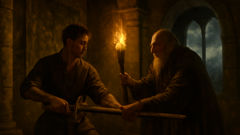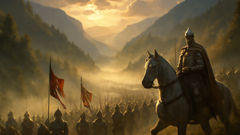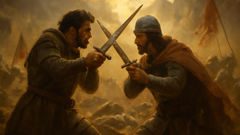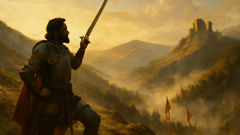Introduction
Spain’s northern borderlands, where the sharp peaks of the Pyrenees cut into the sky and deep forests whisper of old wars, have always been a place of legend. Among the tales carried on the mountain winds, none is told with more pride than that of Bernardo del Carpio. In the medieval era, Spain was a patchwork of embattled kingdoms: Asturias, León, Castile, and others, each caught between the ambitions of powerful rulers and the tides of foreign invasion. In this uncertain world, where loyalty could mean both glory and ruin, Bernardo’s name became a beacon. He was a hero born in the shadow of royal secrets, his very existence both a challenge to the throne and a symbol of hope for the people. Raised in secrecy, Bernardo’s youth was marked by tales of his parents’ forbidden love and the political machinations that kept them apart. Yet from these humble beginnings, he grew into a warrior whose courage was matched only by his sense of justice. At a time when Charlemagne’s Frankish armies threatened from the north, and the Moors pressed from the south, Bernardo stood firm—not just as a swordsman, but as a champion for his family and his homeland. His journey would take him from hidden valleys and remote monasteries to the thunderous slopes of Roncesvalles, where destiny waited. It is a story of courage, loyalty, betrayal, and the quest for justice, echoing through the centuries. In the epic tradition, Bernardo del Carpio’s legend lives on, not simply for his victories in battle, but for the indomitable spirit he inspired in the hearts of all who heard his name.
Born in the Shadows: The Secret Son of Asturias
In a remote tower tucked between the gray-green folds of the Cantabrian mountains, a child drew his first breaths beneath veils of secrecy. His mother, Jimena, was a noblewoman of rare beauty and dignity, bound by duty to King Alfonso II of Asturias. His father, Sancho Díaz, was a knight of Castile, courageous and loyal, but not favored by royal whim. Their love defied custom and king, and their union brought consequences. Jimena was consigned to a nunnery, condemned to a life of quiet sorrow, while her newborn son was taken into the care of distant relatives in the highlands. The boy was given the name Bernardo del Carpio—a name that would someday echo through every valley and fortress from León to Navarra.

Bernardo’s early days were spent in the hush of stone halls, among caretakers who kept secrets as closely as they kept the child. He learned to walk on uneven flagstones, his small hands running over ancient tapestries depicting heroes of old Spain. By candlelight, his first lessons were not just in reading or arms, but in listening to whispered stories: tales of a mother’s love, a father’s valor, and the chains of injustice that bound them both. The legend would say that even as a child, Bernardo’s eyes burned with purpose—a mix of grief and determination that set him apart from his peers.
His guardians, ever cautious, watched as he grew into a youth tall and strong, his hair dark as midnight and his gaze steady. He learned the arts of war: how to wield a sword with balance and how to ride a horse across treacherous mountain paths. Yet more than that, he learned to trust his own judgment. At night, as storms battered the high towers and wolves howled in the forests, Bernardo would gaze out at the wild world, yearning for freedom—not just for himself, but for his mother, whom he had never known, and his father, whose name was spoken only in laments.
The years passed, and rumors began to swirl in the court at Oviedo. Whispers of a young knight with the lion’s courage and the bear’s strength reached the ears of the king. Alfonso II, growing old and wary, saw in these stories both a threat and a promise. He summoned Bernardo to his court, intending to test the boy’s loyalty and perhaps bend him to royal service. Bernardo arrived with no fear, clad in a plain cloak, his sword at his side. Before the king and his gathered nobles, he displayed not just martial prowess, but a keen mind and a sense of justice rare among the ambitious young men of Asturias.
Alfonso, suspicious but intrigued, assigned Bernardo to command a detachment of border guards. It was a test: to keep the Frankish raiders at bay, to enforce peace among feuding lords, and to prove his worthiness. Bernardo took to the task with zeal, earning the respect of soldiers and peasants alike. He became a figure of legend even in his youth—the hero with a mysterious past who defended the mountain passes from all who threatened them.
But in private moments, Bernardo’s heart remained heavy. The king refused to free Jimena or to acknowledge Sancho Díaz’s sacrifice. The laws of men had made him an orphan in all but name. As he looked upon the wild horizon, Bernardo swore an oath: someday, he would break his mother’s chains and restore honor to his family. The promise burned within him, as enduring as the mountains themselves.
The Gathering Storm: Frankish Threats and Spanish Resolve
As Bernardo’s reputation spread, so too did the threats to Spain’s fragile peace. To the north, across the jagged Pyrenees, Charlemagne’s Frankish empire loomed like a thunderhead. Roland, nephew to Charlemagne, was counted among the greatest knights in all Christendom. Stories of his prowess filled the courts of Europe, and his legendary sword, Durendal, was said to be invincible. For many in Asturias, the Frankish menace seemed unstoppable—a wave that would sweep away kingdoms and cultures alike.

The Frankish incursions were not mere raids; they were tests of will. Villages were burned, crops destroyed, and captives taken. The king’s envoys pleaded for alliances with neighboring realms, but suspicion and old rivalries ran deep. Still, the people looked to Bernardo. He rode at the head of his men, defending the mountain passes and striking back against the invaders with cunning and ferocity. Each victory brought new songs, sung by shepherds in the fields and by nobles in their halls.
Yet beneath the outward victories, tension simmered. Alfonso II trusted Bernardo with Spain’s safety, but refused to grant him what he most desired: his mother’s freedom. The king feared that uniting Jimena and Bernardo would create a rival claim to the throne. In desperation, Bernardo sought allies among the nobility—those who remembered Sancho Díaz with respect, and those who resented Frankish interference. Secret meetings in candlelit rooms became the forge for a new Spanish resistance.
In the spring of 778, word spread like wildfire: Charlemagne himself was marching south, determined to subdue the Basques and enforce Frankish rule over the Pyrenees. Roland led the vanguard, accompanied by a glittering host of knights. Their banners flashed in the sunlight as they approached Roncesvalles—a narrow pass where mountains funneled men and horses into a killing ground. It was here that Bernardo saw his chance. With permission from neither king nor council, he gathered a force of Asturian, Basque, and Castilian warriors—men who trusted his courage more than any royal edict.
On the eve of battle, the air was thick with anticipation. Fires flickered on mountain slopes as warriors sharpened blades and whispered prayers. Bernardo moved among his men, speaking words of hope and unity. He reminded them that Spain’s freedom was worth any cost, that no foreign king would ever truly rule these mountains so long as brave men stood together. The night was alive with expectation, and even the oldest soldiers felt the surge of destiny.
As dawn broke over Roncesvalles, the Frankish host entered the pass. The air rang with the sound of hooves and the clangor of steel. Bernardo waited in the shadows, his warriors hidden among rocks and trees. At the signal, they fell upon Roland’s force with a fury born of justice and desperation. The mountains echoed with battle cries, the clash of swords, and the fall of champions.
The Clash at Roncesvalles: Bernardo Faces Roland
The Battle of Roncesvalles began with chaos. As Roland’s men pressed into the narrowest part of the pass, boulders tumbled from above, hurled by hidden hands. Arrows rained from the forests; horns blared defiance. For a moment, the mighty Frankish army reeled, their discipline shaken by the fury of their foes and the treacherous terrain.

Bernardo led from the front, his armor shining in the golden morning light. He moved like a force of nature—his sword flashing, his shield battered but unbroken. Around him surged Basque and Spanish warriors, their cries rising over the clash of steel. Every Frankish knight that fell became a rallying point for Spanish courage. Yet Roland was no ordinary adversary. Astride a warhorse clad in blue steel, the Frankish champion seemed invincible, his sword Durendal cleaving through shield and mail.
At the heart of the pass, among fallen trees and churned mud, Bernardo and Roland met face to face. For a moment, the battle seemed to hold its breath. Roland’s eyes blazed with pride and anger; Bernardo’s with resolve and pain. The two warriors circled, their blades testing each other’s defenses. Swords rang out, echoing off the stone walls. Each blow was a statement—of loyalty, of loss, of the struggle for a homeland’s soul.
Roland pressed the attack, his strength legendary. Yet Bernardo matched him, parrying strike after strike with skill and unyielding will. The sun rose higher, casting shifting shadows across the battlefield. Finally, in a desperate surge, Bernardo forced Roland back. With a cry for freedom and justice, he struck a mighty blow that shattered Roland’s guard. The Frankish champion fell to his knees, mortally wounded. Legend would say that even in defeat, Roland tried to sound his horn for help—but none would come in time.
The death of Roland broke the Frankish morale. Their knights fled or fell where they stood, their banners trampled into mud. Bernardo rallied his men, driving the invaders from Spanish soil. The mountains fell silent once more, save for the mourning of those who had lost sons and brothers on both sides.
In the aftermath, Bernardo’s name became legend. Songs spread from village to village, telling of the hero who had faced Roland and emerged victorious. Yet even in triumph, Bernardo’s heart remained heavy. The king still refused to release Jimena or to honor Sancho Díaz’s memory. Bernardo returned to Oviedo not as a conqueror, but as a son seeking justice.
Conclusion
With the Frankish army shattered and Roland vanquished, Spain’s mountain passes breathed easy—if only for a while. Bernardo del Carpio returned home not as a prince or a conqueror, but as a hero who fought for those denied justice. Though King Alfonso II never granted his mother’s freedom nor fully honored Bernardo’s lineage, the people’s songs did what kings could not: they made Bernardo immortal. His name became a symbol of courage against impossible odds, of loyalty stronger than law, and of the hope that justice might yet prevail in a world ruled by power. In every generation since, Spaniards have found inspiration in his story—on mountain trails where shepherds walk, in ancient towns where church bells toll, and in every heart that dares to challenge fate. The legend of Bernardo del Carpio endures, its echoes carried by the winds that sweep through Roncesvalles and beyond.













